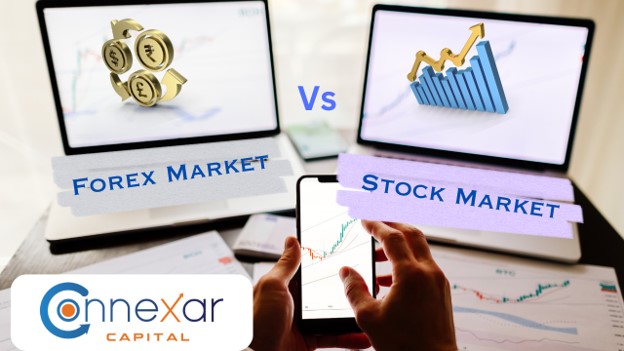
Introduction
Aspiring traders and seasoned investors often find themselves faced with a perplexing question: Should I trade in the Forex market or the stock market? Both markets offer unique opportunities and challenges, and the decision between the two largely depends on individual preferences, financial goals, risk appetite, and trading expertise. In this blog, we will explore the key factors to consider when choosing between the Forex market and the stock market, helping you make a well-informed decision that aligns with your trading aspirations.
Market Accessibility and Hours
Forex Market:
The Forex market operates 24 hours a day, five days a week, due to its global nature. This means that traders can engage in trading at any time, allowing for flexibility and the ability to respond quickly to breaking news and economic events across different time zones.
Stock Market:
Stock markets have set operating hours, typically following the business hours of their respective countries. For example, the New York Stock Exchange (NYSE) operates from 9:30 AM to 4:00 PM Eastern Time. This limited trading window may not suit traders with busy schedules or those seeking round-the-clock opportunities.
Liquidity and Volatility
Forex Market:
The Forex market is the largest financial market globally, with high liquidity. Major currency pairs typically have narrow spreads and minimal slippage, making it easier to enter and exit trades without significant price fluctuations. However, high liquidity also means that sudden market movements can occur, leading to both opportunities and risks.
Stock Market:
While the stock market is generally less liquid than the Forex market, major stocks of large companies still offer reasonable liquidity for most traders. The stock market tends to be less volatile compared to the Forex market, but individual stocks can experience substantial price swings, especially during earnings reports or major announcements.
Market Influence and Risk Factors
Forex Market:
The Forex market is heavily influenced by global economic events, geopolitical developments, and central bank policies. Traders in this market must closely monitor economic indicators, interest rates, and political news from various countries to make informed decisions. Such complexity can be both challenging and exciting for traders with an interest in macroeconomics.
Stock Market:
The stock market is also impacted by economic factors, but individual stocks can be influenced by company-specific news, earnings reports, and industry trends. In-depth research on companies and sectors is crucial for stock market investors to make wise investment choices.
Leverage and Margin
Forex Market:
Forex brokers often offer high leverage to traders, allowing them to control larger positions with a relatively small initial capital investment. While leverage can amplify potential profits, it also increases the risk of significant losses. Traders should exercise caution and adopt appropriate risk management strategies when using leverage.
Stock Market:
Stock market regulations generally restrict the amount of leverage available to retail investors, aiming to protect them from excessive risk. This means that traders in the stock market may need to invest more capital to achieve similar exposure to their positions compared to the Forex market.
Conclusion
Deciding between the Forex market and the stock market requires a careful evaluation of your trading style, risk tolerance, and financial goals. The Forex market offers 24-hour accessibility, high liquidity, and diverse currency pairs but comes with higher volatility and complexity. On the other hand, the stock market provides opportunities to own stakes in companies, historical performance, and regulatory protection, but operates with limited trading hours and lower leverage.
Ultimately, the best choice depends on your preferences and objectives. Some traders may prefer the dynamic and fast-paced environment of the Forex market, while others may opt for the stability and long-term growth potential of the stock market. Many traders diversify their portfolios to benefit from the unique advantages each market offers. the Forex market's 24-hour accessibility, high liquidity, diverse trading options, and leverage opportunities give it an edge over the stock market in certain aspects
Remember, success in either market requires diligent research, risk management, and continuous learning. Whichever path you choose, strive to stay informed and adapt to the ever-changing market conditions to enhance your trading journey. Happy trading!
#ForexVsStocks #TradingComparison #ForexMarket #StockMarket #TradingDecisions #InvestmentChoices #TradingSuccess #FinancialMarkets #TradingProsAndCons #ForexTrading #StockTrading #InvestingDilemma #MarketAnalysis #TradingStrategies #MarketVolatility #TradingOpportunities #InvestmentTips #ForexProsAndCons #StockProsAndCons #TradingComparisonGuide